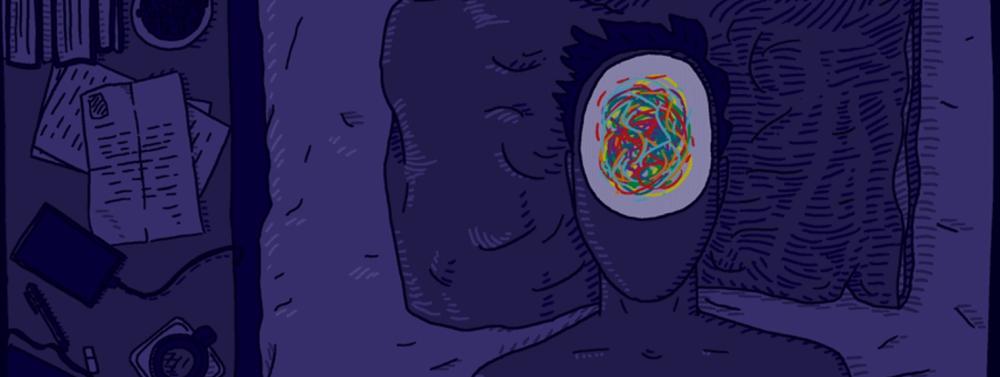Sleep is a crucial part of our lives – it reenergises our cells, boosts learning and memory, and even regulates our hunger, immune function, mood and libido. We spend almost one third of our lives sleeping, but do you really know what our brains are up to during that time? The science behind sleep has been one of the most elusive mysteries to date, and it only gets more interesting as we uncover more.
PART I: Sleeping & Dreaming
Sleep’s Phases
There’s two different kinds of sleep, the first is slow-wave sleep (SWS) and the second is rapid eye movement sleep (REM).
When we sleep, our brain doesn’t actually shut off. It goes through a sequence of events that slowly puts itself to sleep in phases; it’s basically working through the night while your body is snoozing. Many regions of our brain – such as those responsible for learning and emotion – are more active during the sleep than in the day. That’s why we sometimes remember and process things more clearly after a good night’s rest.
Sleep first starts during the SWS phase, and when this happens, you start losing consciousness. Most of our sleep occurs in this phase, when our muscles start to relax, and our breathing deepens and slows down. After the SWS phase, our brain moves into the REM phase, and this is where we start dreaming. Here, our brain becomes more active, our muscles start to paralyse and our breathing and heart rate increases.
Till this day, no one really knows why we dream; it’s definitely a bizarre phenomenon. But what we do know is that we have a specific type of brain cells that control REM sleep. When these cells are damaged or lost, we don’t experience muscle paralysis that naturally occurs during REM sleep. This leads to a sleeping behaviour disorder that might cause you to violently act out of your dreams.
Why Do We Dream?
Some of us may insist that dreams carry special meanings or a deeper purpose, but scientists have argued otherwise. Many scientists consider dreams to be a by-product of sleep, a biological phenomenon without benefit.
However, other studies have shown that dreaming plays a role in specific emotional activity; your dreams’ emotional content has a correlation with noradrenaline, the substance responsible for heart rate and blood pressure. When you dream, your brain also gets saturated with a heap of acquired knowledge and analyses overarching similarities, which helps with creative problem solving.
Lucid Dreaming
Have you ever woken up in your dream? Lucid dreaming is when we become aware that we’re dreaming, while dreaming. In this experience, you’ll suddenly realise that the event is not actually happening in physical reality, and in turn, your senses will come to life and become more authentic. You may even have greater control over your behaviour, thoughts and actions in your dream. It sounds a little crazy, we know, but it’s still safe and natural.
Paying Off The Sleeping Debt
We’ve all heard about the wonders of power napping, but does science agree? The answer is yes. Research has shown that napping does benefit us, but only when you time it with your sleep cycle. This means that we either have to have a quick nap or a long nap, so we don’t interrupt our sleep cycle and end up feeling tired after.
Here’s a quick breakdown:
- Less than 20 minutes of napping is great for cognition, but you’ll be easily awakened
- Around 90 minutes of napping is optimal as it allows you to complete 1 sleep cycle
- Between 20 to 90 minutes of napping may leave you feeling tired and grumpy, as you’ll face a higher risk of interrupting your sleep cycle.
This may sound confusing to you, but the good news is that regularly napping for just 20 minutes can still bring benefits for the brain.
PART II: Sleeping Disorders
With all that talk about sleep, let’s now get into what happens without it. There are more than 50 classified sleeping disorders which can affect your lifestyle, but in this article, we’ll talk about a few of the key ones.
Sleep Apnea
If you’ve not heard of sleep apnea, I’m sure you’re familiar with snoring. Snoring may be annoying, but it’s actually a major symptom of obstructive sleep apnea, which occurs when your breathing is interrupted by a closed airway during sleep.
Those suffering from this disorder may wake up during the night and start choking or gasping for air. Sleep apnea can lower your oxygen levels and keep you from having a good night’s rest, causing you to feel tired and groggy the next day.
Sleep-walking & Sleep-talking
Sleep-walking or sleep-talking are two forms of “parasomnias”, a sleep disorder that can range from soft talking during sleep all the way to waking up violently from your sleep. The most common cause for walking and talking in your sleep includes poor sleep hygiene and sleep deficiency. Sometimes, using technological devices, drinking alcohol or taking drugs before bed can also trigger these symptoms. These disorders can also be hereditary, so keep a look out for family members who also exhibit these symptoms.
Restless Legs Syndrome
RLS occurs when you get intense, uncomfortable sensations in your legs and feet before you fall asleep, potentially causing insomnia and sleep disruption. This may be due to nerve damage, certain medications, pregnancy, iron deficiency or other health conditions.
Insomnia
If you have difficulty falling asleep, staying asleep or find yourself waking up constantly, chances are, you’re suffering from insomnia. People who have this disorder would wake up feeling tired and unrefreshed, which affects their day-to-day functions, and it’s quite a common occurrence in many adults.
Narcolepsy
Narcolepsy causes excessive daytime sleepiness; people with this condition often feel very sleepy during the day and fall asleep involuntarily. These sleep attacks are called cataplexy, and can interrupt the sufferer’s work, leisure and interpersonal relations. With this condition, you’ll also be more prone to accidents.
Sleep Paralysis
Sleep paralysis happens when you wake up, and feel like you’re frozen or unable to move your body. When this occurs, you may also experience hallucinations which seem very real. All of this occurs as a result of sleep inertia, a state of impaired cognition and performance because your body hasn’t caught up with the fact that you’re awake
Again, the main cause of this is sleep deprivation, and can occur if you typically have irregular sleeping patterns and decide to return to a regular sleeping schedule. People who suffer from stress or post-traumatic stress disorder (PTSD) have a higher risk of encountering sleep paralysis.
If any of these conditions sound familiar to you, schedule a consult with our doctors so that you can get the help you need for a good night’s sleep.







